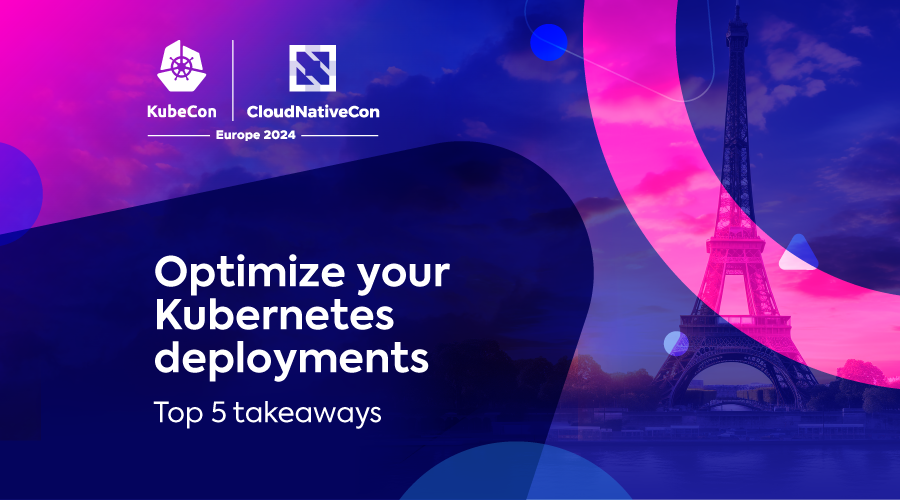
Another KubeCon has passed! Now that we have all (hopefully) recovered from the week in Paris with good food, wine, and catching up with colleagues, let’s talk about the important topics that took center stage at KubeCon EU 2024 this year.
As we celebrate the 10th anniversary of the initial Kubernetes release, it’s evident that the growth and positive impact of containerized computing have revolutionized the industry. Kubernetes is now a crucial component of enterprise information technology and is becoming “The Operating System of the Cloud.”
Here are the five key takeaways from KubeCon EU 2024:
1. Platform engineering: The convergence of infrastructure and delivery
Platform engineering emerged as a prominent theme at this year’s conference. The community is actively seeking ways to strike a balance between infrastructure optimization and delivery, enabling faster and more confident deployments. We have seen a lot around platform engineering as a practice, but now we are seeing a real movement towards standardization and agreed-upon nomenclature so that we can all start from the same place. Notably, enterprise-focused frameworks like CNOE stress convergence, cost management, and managed services to simplify the adoption of CNCF tooling and GitOps for Internal Developer Platforms (IDPs).
2. Service mesh: Enabling seamless communication and observability
Service mesh is the future of cloud-native and containerized workloads. Think of a service mesh as a behind-the-scenes helper that facilitates communication and observability across various aspects of your workload, including traffic flow, security, and performance. Unified control tools like NetApp’s BlueXP and Cloud Insights are going to be pivotal to ensuring you can balance between availability, performance, and growth at scale.
3. Evolving notions of data management: Extending beyond traditional concepts of storage
While storage remains critical, no matter where it sits, the evolving landscape necessitates a broader understanding of “data” and “management” to meet the needs of current issues. Classifying data (hot, warm, and cold) and effectively managing compliance and access controls are becoming crucial components of data management. And as artificial intelligence, machine learning, and language-learning models (AI/ML/LLM) evolve, so does the management and “wrangling” of the data powering this innovation.
Every company will face challenges around the management, availability, and security of data. Understanding the considerations of using PersistentVolumeClaim (PVC) and dynamic volume expansion, while having deep and insightful observability into the performance of the data layer, will be key. Additionally, we know that 60% of all data is written once and never written again, but workloads still have to have the intelligence to know what they need when they need it. What does long-term strategy look like? How will these concepts change? These were all top-of-mind questions as people explored how NetApp’s unique Storage and Cloud tools can solve these challenges at scale.
4. Community innovation and problem solving
As evidenced by the week in Paris with over 12,500 conference attendees, the collaborative and innovative nature of the open-source community is an undeniable benefit. Watching industry-wide collaboration, community innovation, and the problem-solving of complex technical and business issues was my favorite part. When we meet again in the fall for KubeCon NA in Salt Lake, it will be exciting to see the resolution of these challenges and the launch of new open-source projects to help everyone move faster.
5. Exploring innovative use cases
Kubernetes and other CNCF-incubated projects continue to inspire innovative use cases. If you have never experienced co-located events for CNCF projects at KubeCon or a B-Sides conference like Cloud Rejekts, you really should because those are the real value of one-to-few content and collaboration. These gatherings showcase the true value of open-source software and its ability to foster creativity and growth.
As Kubernetes solidifies its position as a critical component of enterprise information technology strategy, the ecosystem surrounding it will continue to grow. One thing we get to see at KubeCon is the unique way it captures the passion and pride of the community, which has made Kubernetes accessible, inclusive, and open to new ideas. The event serves as a testament to the remarkable achievements and future potential of this transformative technology. I am excited to see what happens.
Ready to power up your Kubernetes deployments? Get expert insight into running more reliable, efficient, and fully automated Kubernetes on public cloud in The Complete Guide to K8s Autoscaling.
